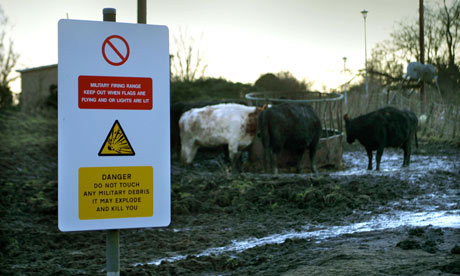Armed forces minister sorry for misleading MPs over depleted uranium
MoD urged to phase out use of depleted uranium weapons after armed forces minister admits review was never carried out
The armed forces minister has been forced to apologise over misleading statements he made regarding the legality and dangers of depleted uranium weapons.
Nick Harvey admitted that he had inadvertently misled MPs about a Ministry of Defence review that he said had concluded the weapons were permissible on humanitarian and environmental grounds under the Geneva conventions.
It subsequently emerged that the review had never happened, and Harvey has apologised for the error, which he said had been made "in good faith". He has ordered that a review into the weapons' legality be carried out by civil servants. The department is facing calls for the weapons to be suspended until it is completed.
The revelations come as a cross-party campaign is launched to pile pressure on the MoD to phase out the use of depleted uranium (DU). The tank shells that depend on it have to be renewed in 2013.
DU is a chemically toxic and radioactive heavy metal produced as waste by the nuclear power industry that is included in weapons because it is an extremely hard material capable of piercing armour. Once the frontline has moved on, however, it can contaminate the environment, and has been linked to health problems in civilian populations.
The British army fired shells containing 2.3 tonnes of DU during the Gulf wars in 1990-91 and 2003. DU is used to harden 'Charm3' armour-piercing shells carried by British Challenger tanks.
In 1998 the UK government ratified additional protocol 1 of the Geneva conventions. Article 36 of that requires that all weapons are subject to a legal review to assess whether they are "capable of being used discriminately", or cause "widespread and severe damage to the natural environment".
In the past few years anti-DU campaigners have repeatedly been assured by the MoD that DU weapons had undergone such a review and been cleared. Most recently, on 10 October, Harvey wrote to the Labour MP Katy Clark saying that "the conclusions of the original legal weapons review on Charm3 are extant", and that "DU can be used within weapons".
But when Clark then asked to see the review, Harvey said it did not actually exist. "A subsequent search of departmental records has failed to find any such review," he told her on 26 October. "Though incorrect, the statement in my letter was made in good faith on the advice of officials, and I apologise for the error."
Harvey added: "In the circumstances, and given the concerns that have been expressed over DU, I have directed that a legal review should be carried out to establish the position clearly."
Clark accused the MoD of misleading the public, and demanded a public apology. "Compliance with the Geneva conventions has been used to reassure people on the legality of DU weapons, however no review has taken place to ensure that the munitions used by UK armed forces meet the conventions' criteria," she said. "I am pleased that the government has stated that a review will now take place and believe it should use this opportunity to carry out a detailed study into the long term impact of DU use."
Clark is one of the sponsors of an early day motion in the House of Commons calling on ministers to stop using DU weapons before Charm3 expires in 2013. The motion is backed by other Labour, Liberal and nationalist MPs, as well as the Conservative MPs Peter Bottomley and Zac Goldsmith.
Aneaka Kellay from the Campaign against Depleted Uranium, called for Charm3 to be immediately removed from service until its risks had been legally reviewed. "We find it extremely disappointing that the MoD has misled parliamentarians and the public," she said. "It seems bizarre that, given the long history of justified concerns over the potential health and environmental impact of these weapons, assessing whether they may be illegal was not prioritised before they entered service."
The MoD argued that it did not need to review weapons that predated its ratification of the Geneva protocol in 1998. But campaigners pointed out that Charm3 entered into service in 1999 as a modification of an earlier DU shell.
According to Prof Manfred Mohr, from the International Coalition to Ban Uranium Weapons, munitions should be subject to a legal review when they are modified. "It is therefore surprising that the UK failed to adequately review the legality of Charm3," he said.
According to Prof Manfred Mohr, from the International Coalition to Ban Uranium Weapons, munitions should be subject to a legal review when they are modified. "It is therefore surprising that the UK failed to adequately review the legality of Charm3," he said.
The MoD made clear it would continue to retain its DU capability and was "considering options" for renewing the Charm3 propelling charges in 2013. But because of "public concerns" it had begun a legal review. "The use of depleted uranium within weapons is not prohibited under international agreements," said a spokeswoman. "Until the review concludes, our position remains unchanged."




Nessun commento:
Posta un commento